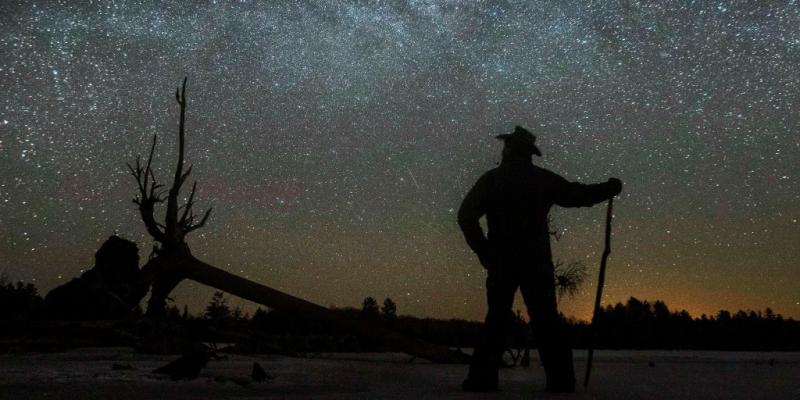Twinkle, twinkle fading stars: Hiding in our brighter skies
Category: News & Politics
Via: perrie-halpern • last year • 6 commentsBy: Associated Press By Associated Press



WASHINGTON — Every year, the night sky grows brighter, and the stars look dimmer.
A new study that analyzes data from more than 50,000 amateur stargazers finds that artificial lighting is making the night sky about 10% brighter each year.
That's a much faster rate of change than scientists had previously estimated looking at satellite data. The research, which includes data from 2011 to 2022, is published Thursday in the journal Science.
"We are losing, year by year, the possibility to see the stars," said Fabio Falchi, a physicist at the University of Santiago de Compostela, who was not involved in the study.
"If you can still see the dimmest stars, you are in a very dark place. But if you see only the brightest ones, you are in a very light-polluted place," he said.
As cities expand and put up more lights, "skyglow" or "artificial twilight," as the study authors call it, becomes more intense.
The 10% annual change "is a lot bigger than I expected — something you'll notice clearly within a lifetime," said Christopher Kyba, a study co-author and physicist at the German Research Centre for Geosciences in Potsdam.
Kyba and his colleagues gave this example: A child is born where 250 stars are visible on a clear night. By the time that child turns 18, only 100 stars are still visible.
"This is real pollution, affecting people and wildlife," said Kyba, who said he hoped that policymakers would do more to curb light pollution. Some localities have set limits.
The study data from amateur stargazers in the nonprofit Globe at Night project was collected in a similar fashion. Volunteers look for the constellation Orion — remember the three stars of his belt — and match what they see in the night sky to a series of charts showing an increasing number of surrounding stars.
Prior studies of artificial lighting, which used satellite images of the Earth at night, had estimated the annual increase in sky brightness to be about 2% a year.
But the satellites used aren't able to detect light with wavelengths toward the blue end of the spectrum — including the light emitted by energy-efficient LED bulbs.
More than half of the new outdoor lights installed in the United States in the past decade have been LED lights, according to the researchers.
The satellites are also better at detecting light that scatters upward, like a spotlight, than light that scatters horizontally, like the glow of an illuminated billboard at night, said Kyba.
Skyglow disrupts human circadian rhythms, as well as other forms of life, said Georgetown biologist Emily Williams, who was not part of the study.
"Migratory songbirds normally use starlight to orient where they are in the sky at night," she said. "And when sea turtle babies hatch, they use light to orient toward the ocean — light pollution is a huge deal for them."
Part of what's being lost is a universal human experience, said Falchi, the physicist at University of Santiago de Compostela.
"The night sky has been, for all the generations before ours, a source of inspiration for art, science, literature," he said.
Associated Press



Kinda makes me glad i live in a place that has about 6 people per square mile .
I can drive 20-30 miles out into the sage brush and cant see the lights of any towns .
it is a pretty gobsmacking experience to look up and see the entire universe before you in infinite detail .
That it is. It's been a long time since I've slept out under the stars and seen the Milky Way. I've thought about how much I want to see that again.
I've noticed it is becoming a problem here. It used to be on a moonless cloudy night it would be near pitch black here and the clear nights you could see a little with the starlight, Venus would even cast a shadow. Now on a moonless cloudy night its lit up like an hour after sunset all night and there hasn't been any change in the population here, but what has changed is how much you can save on electricity going to LEDs so people have put up more and brighter lights. It is now the clear nights that are darker because there is no reflection from the lack of clouds.
I live in a rural setting but I still have light pollution. Walmart is about 2 miles down the road and I can see it's lights from my back porch
Star light, star bright
Wait...that was the ISS
Star light, star
Wait...that was space debris
Star light
Wait, that was a satellite
Star
wait...that was Mars
Sta
Wait...that was an airplane
Eh, fuck it.
Funny. Last night I was bored so I watched part of the show How The Universe Works with Mike Rowe.
All stars are going to die. Eventually there will be no more stars as they all run out of fuel.
If people are around long enough, they would see the night sky grow dimmer.